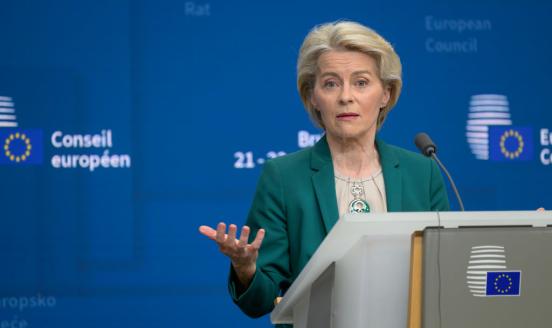The first step in Europe’s banking union is difficult but achievable
The leaders of Eurozone countries made an unprecedented commitment when they issued on June 29 a statement starting with the words “We affirm that it is imperative to break the vicious circle between banks and sovereigns.” This statement officially acknowledged their intention to break the “doom loop” of mutually reinforcing deterioration of credit conditions afflicting weaker member states and banks headquartered in them. Spain is a prime example of the problem. Severing that feedback loop requires a transfer of vast parts of the banking supervision and policy apparatus from the national to the European level, or banking union. It is probably a prerequisite for maintaining the integrity of Europe’s monetary union in any crisis resolution strategy. Equally important, a failure to deliver on this clearly articulated pledge would severely impair investors’ already damaged confidence in the ability of the Eurozone governments to act collectively.
The action plan outlined in the June statement defines a sequence of two explicit steps. The European Central Bank (ECB) should first be endowed with broad supervisory powers and become the anchor of a “single supervisory mechanism” for participating member states. Then, once this mechanism is deemed “effective,” the European Stability Mechanism (ESM), which is the Eurozone’s newly-established intervention fund, would be able to recapitalize banks directly. Corresponding instruments remain to be clarified but would probably include common equity.
This sequence is unsatisfactory. Making European-level crisis management action (including bank recapitalizations by the ESM) contingent on the establishment of a permanent institutional infrastructure (i.e., an effective single supervisory mechanism) looks like a delaying tactic, in denial of the urgency of the present situation. Moreover, the leaders’ proposed sequence avoids essential elements of a credible banking union, such as a European banking charter, resolution authority and federal deposit insurance. This leaves the policy framework incomplete.
In spite of these frustrating flaws, however, the June statement is the boldest reaction so far of European leaders to the Eurozone crisis. They must now urgently transform this pledge into concrete decisions. The European Commission has done its bit by publishing a legislative proposal for the establishment of the single supervisory mechanism, on September 12. Three major issues of contention have emerged in the negotiations among member states.
First, the geographical perimeter: the June 29 statement identifies article 127(6) of the European Union’s Lisbon Treaty as the legal basis for the initiative, which means the new supervisor will be part of the ECB. But some non-Eurozone member states, including in Central Europe and Scandinavia, may legitimately want to join it, and they have a veto over decisions under article 127(6). They should be entitled to a voice in the new system’s governance, and to appropriate safeguards of their taxpayers’ interests. Even though one important member state, the United Kingdom, has unambiguously declared it would not join the single supervisory mechanism, the approach should be as inclusive and flexible as possible.
Second, monetary policy independence: banking policy and monetary policy are linked but ultimately different, which also justifies different geographical perimeters within the EU for currency union and banking union respectively. There is a legitimate concern that adding supervision, a politically charged task, to the ECB’s responsibilities, may compromise its cherished independence. The supervisory function should be strictly separated from the rest of the ECB, with full institutional autonomy possible in future reform steps.
Third, German savings and cooperative banks, which are local banks subject to a different policy regime from commercial banks, oppose their being brought under the new European supervisor’s authority. Given Germany’s pivotal position in all Eurozone discussions, some of its idiosyncrasies may have to be accommodated. There could be a separate European supervisory framework for systems of local non-commercial banks that would meet adequate conditions, for example.
Negotiators also need to ensure that the new supervisor’s governance is less dysfunctional than that of the ill-fated European Banking Authority, whose clumsy decision-making process was hampered by its reliance on diplomatic compromises among member states, in spite of a high-quality staff. Effective supervision requires that controversial decisions be made quickly, while guaranteeing genuine accountability to democratic institutions. At the same time, the legal basis for new arrangements must be robust and include mechanisms for judicial review. Further legal debate is needed on whether this is best achieved under article 127(6) or other Treaty provisions.
Creating Europe’s single supervisory mechanism is only one step on a much longer path towards crisis resolution and banking union. Compromise on it will be difficult but possible. Leaders must not lose the momentum created by their June 29 commitment, and should try to reach a final legislative decision before the end of this year.



